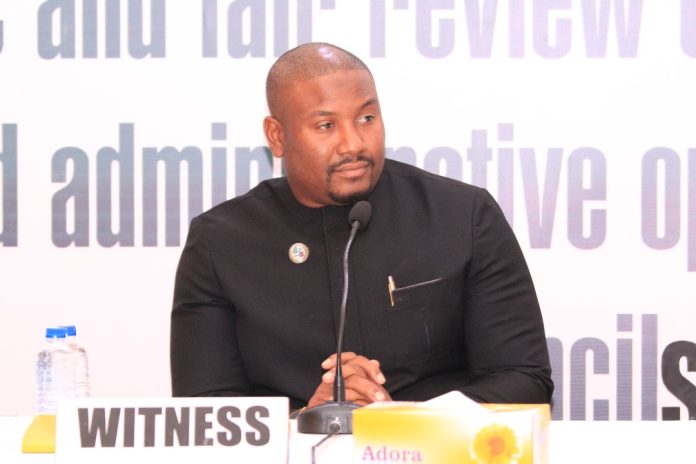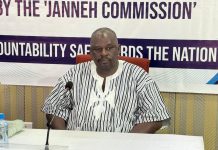By Yankuba Jallow
On Monday, 8 September Mayor Talib Ahmed Bensouda faced questioning before the Local Government Commission of Inquiry in a session that delved into hiring practices, family connections, and the controversial role of a figure known within the council as Kanjura Kanyi.
The Commission, chaired by Ajaratou Jainaba Bah, has been tasked with a comprehensive review of local government operations from May 2018 to January 2023, aiming to enhance transparency and accountability.
During the public hearing, Lead Counsel Patrick Gomez questioned Mayor Bensouda about the appointment of lawyer Yassin Senghore. Senghore, already a subject matter specialist and a member of the Establishment and Appointment Committee, had been tasked with handling council affairs. When asked about the fairness of appointing someone so closely tied to KMC operations, Bensouda explained, “Senghore knew the council and we wanted to deal with someone who knows the council.” He emphasized that the decision reflected the practical need for experience and institutional knowledge.
The discussion then turned to the appointments of Nuru Deen Adams and Isatou Faal as protocol officer and public relations manager. Gomez highlighted concerns raised by councillor Habib Ceesay and former CEO Salama Njie regarding potential conflicts of interest, including the hiring of individuals with close ties to the mayor. Bensouda acknowledged the political reality of his office: “I wish I had the power to appoint them all of them.” He said he referred applications to councillor Ceesay and Dembo Jah, noting that he did not attend committee meetings because he was not a member. Yet, Gomez presented minutes showing the mayor had been present at a meeting where Faal’s appointment was discussed. “It appears from the documents that the application was 7 June 2018 and the appointment date was 7 June 2018 — the same day while the Establishment Committee discussed the matter the following day,” Gomez said. Bensouda agreed that the appointment was “incorrect.”
Faal was appointed to grade 10.1, among the highest in The Gambia’s salary grading structure, despite holding only a certificate or diploma in IT. When asked whether this was an appropriate method for hiring, Bensouda said, “It depends whether it is direct or indirect entry.” He described indirect entry as allowing candidates to take positions while pursuing further education, adding that the council voted to let Faal continue on the condition that she furthered her studies.
The inquiry also examined the employment of family members. Bensouda confirmed that his uncle, Baboucar Jammeh, and his aunty, Adama Jammeh, had worked at KMC. “I told him I don’t want him here [at the KMC],” he said, explaining that he later employed his uncle at a private NGO. Bensouda highlighted the longevity of Adama Jammeh’s service, noting that she had been in the council since 1988, when the mayor was only two years old. “I would not say it is a coincident… I would have loved to bring many more people as part of my team who I trust and can rely on. But the fact of the matter is that I can’t,” he said. He added, “I can tell you for a fact, I am dissatisfied that I could not work with my team. I would have wished to employ my full office.”
Beyond appointments, the inquiry focused on Kanjura Kanyi, a consultant described by many KMC employees as untouchable and highly influential. Bensouda confirmed that Kanyi’s contracts, dated 14 January 2021, 10 February 2022, and 1 October 2022, were intended to harness his perceived effectiveness in managing council operations. “At some point, we found the use for him fid recovering very hard to recover debts and I believe he helped to recover D23 million from NAWEC and D7 million from another big businessman. These were bad debts,” Bensouda testified.
Kanyi’s responsibilities included regularizing the market, managing the notorious Bakoteh dumpsite, and implementing operational systems such as the “Red Flag System,” credited with preventing fires at the dumpsite for four years. Bensouda described the complex environment: “We needed a hard liner because there are ample lot of stakeholders such as scavengers, neighbours of the site, those that melt metals and donkey cart operators. At least 300 people make their living from the site.”
Gomez questioned whether Kanyi’s consultancy complied with procurement laws, citing the requirement for GPPA approval. Bensouda responded that “all his consultancies were below D500,000 annually,” suggesting that no GPPA approval was necessary. Gomez pressed that any contract, regardless of amount, should follow established procedures, including quotations from multiple sources.
The inquiry revealed additional controversies over funds and disciplinary matters. In April 2019, Kanyi received a letter from director of administration Dembo S.N. Sanneh suspending him for two weeks without pay over D180,000 that had not been retired. Kanyi’s response was blunt: “Thank you for writing rudely to me. Whoever directed tou to suspended me is rude and stupid and does not know his terms of reference. Truly, tiu are all cowards and I hope you remain cowards. I will use your original letter as a toilet paper in my next visit to the toilet.” Bensouda, while acknowledging the severity of the letter, defended Kanyi’s contributions to the council. “It is a terrible letter,” he said.
The session also revisited the council’s authority to approve appointments and extend contracts. Bensouda acknowledged that appointments above grade 5 should be referred to the Local Government Service Commission, yet maintained that Kanyi’s contracts were within the council’s discretion at the time. “It was at the discretion of the Establishment Committee and decided on the council based on the specialised operations we required at the time. He [Kanyi] was the only man equipped based on our understanding,” Bensouda said.
Despite criticism that Kanyi lacked formal qualifications, Bensouda emphasized the consultant’s operational effectiveness. “I can attest that Kanyi is one of the most operational effective and proficient characters you can find in this country, if you need things done,” he said. He credited Kanyi with stabilizing council operations, recovering debts, and implementing measures that benefited the market and wider municipality.



















